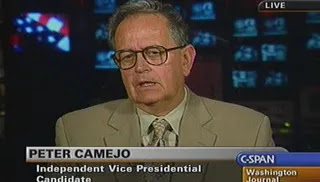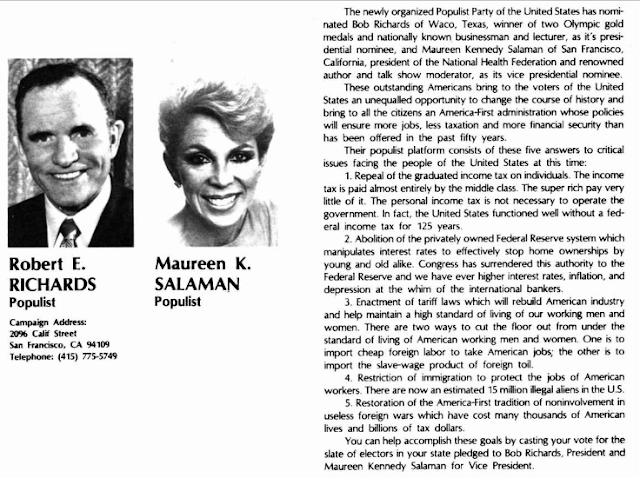Moore and Maher beg Nader not to run in 2004
Peter Miguel Camejo Guanche, December 31, 1939 (New York, NY) – September 13, 2008 (Folsom, Calif.)
VP candidate for Independent (aka Populist Party aka Reform Party of the United States of America aka Better Life aka Peace and Justice Party aka Unaffiliated aka Independent Party of Delaware) (2004)
Running mate with nominee: Ralph Nader (b. 1934)
Popular vote: 235,856 (0.19%)
Electoral vote: 0/538
The campaign:
Expressing a desire to not become beholden to the platform of any party, Ralph Nader announced he was running for President in 2004 as an independent. Yet he also sought the endorsement (rather than the nomination) of several already established third parties as a way to more easily acquire ballot access. The Reform Party, Independent Party of Delaware, and Independence Party did just that, making him their de facto nominee. Some parties were simply invented as a 2004 one-shot deal due to local requirements. For example, Nader ran in Alaska, Arkansas, and Maryland under the Populist Party name, apparently unconcerned of the legacy of white nationalist policies connected with the recent party of that name 1984-1996 and still a fresh memory.
Although Nader never joined the Green Party, it was under their banner that he was perceived, perhaps unfairly, as being the spoiler in the 2000 election and handing the White House to George W. Bush especially in Florida. The Green Party had some significant differences of opinion within their ranks on how to proceed in 2004. Generally speaking there were three factions at play here.
The first group desired to endorse Ralph Nader's independent run. Nader himself had announced in Dec. 2003 he would not seek the Green nomination, but later he realized the Party's endorsement would come in handy in terms of ballot access although he had no intention of joining the Greens himself. The pro-Nader faction was energized when a week before the Green convention Nader had selected GP activist Peter Camejo as his running-mate. Camejo in fact had won the most popular votes in the Green Party primaries for President.
The second group wanted to run a campaign with a "pure" Green candidate (David Cobb was the frontrunner) rather than ride on the star power of a political celebrity who was not necessarily in line with the Party platform. Cobb, a California attorney and Party activist, had worked hard to gain the nomination as he electioneered across the country gathering delegates.
The third group promoted the idea of sitting out the 2004 Presidential contest and instead concentrate on elections at the grassroots local level. A leaflet from this faction at the convention included, "Choosing No Candidate will allow Greens to build strength at the grassroots, avoiding a punishing national media fight we cannot win ... Our best route to national influence is building local power."
On June 26, 2004 Cobb won the nomination on the second ballot. He named Pat LaMarche, a Green Party activist in Maine, as his running-mate.
Unlike Nader/Camejo the Cobb/LeMarche ticket adopted a "safe state" strategy of not campaigning hard in swing states where they thought they could possibly tip the scales in favor of Bush. Cobb rationalized, "In California, Cobb-LaMarche's message is going to be, 'Progressives, don't waste your vote.' Because if a progressive casts a vote for the corporate militarist John Kerry in California, it does not help to unelect Bush, and you can only send a message that you actually support policies that you don't. That's a wasted vote. Simple message: progressives, don't waste your vote. In the other states where it's very much closer, we have the same, in-depth, scathing critique of both the Democratic and Republican parties, and then conclude with, 'but think carefully before you cast your vote.' You know, that is completely respecting the voter, and it is really challenging those voters to think about why we have a system where I have to vote against what I hate, rather than support what I want."
LaMarche suggested she just might pull the level for the Democrat on Election Day, "If the race is tight, I'll vote for Kerry."
A swath of the Left felt the Greens were capitulating to the Democrats far too much. The Vermont Green Party broke ranks and endorsed Nader/Camejo. Other Greens appeared to migrate to the Socialists in 2004, giving them a larger popular vote than usual.
Peter Camejo spent most of his early years in Venezuela, although he was born in New York.
Camejo had a long history as a worker for social justice issues. He had participated in one of the Selma civil rights marches in 1965. Two years later he was expelled from UC Berkeley for his demonstration activities. Gov. Ronald Reagan called him one of the ten most dangerous people in California because he was "present at all anti-war demonstrations." Camejo was also an activist for migrant farm workers' rights.
During this era Camejo's political vehicle was the Socialist Workers Party. He was their Presidential nominee in 1976. As the SWP became more rigid and some say cult-like as they assigned Party workers places to live and work and infiltrate, Camejo either quit or was expelled in 1980. "I tried to make changes inside the SWP, and it was very difficult. I guess it's like being in the Catholic Church and suggesting that Mary wasn't really a virgin or something," he later said.
He gravitated to the Green Party, supported Nader for President in 1996 and 2000, and by 2004 had already run twice as a Green for the office of California Governor, including in that wild 2003 recall election with 135 candidates.
In the four years since Nader last ran 9/11 had happened and the Bush administration was wrapping up their first term. Although President Bush called himself a uniter, not a divider, his economic policy, military initiatives, and interpretation of civil liberties under the Constitution seemed to widening the polarization of the country. Many in the Progressive side were willing to overlook Sen. Kerry's centrism and spent not a small amount of energy attempting to get Nader out of the race or off the ballots.
In one the most famous incidents in the 2004 campaign Bill Maher and Michael Moore got down on their knees and begged Nader on the
Real Time television program on July 31, 2004 to drop out of the race.
There were others who agreed--
Keeping the Bush circle out means holding one's nose and voting for some Democrat. ... In a very powerful state, small differences may translate into very substantial effects on the victims, at home and abroad. It is no favor to those who are suffering, and may face much worse ahead, to overlook these facts.–Noam Chomsky
I am going to run around this country and do everything I can to dissuade people from voting for Ralph Nader. ... this election will come down to a relatively few votes. ... I consider four more years of Bush a potential horror show for this country.–Bernie Sanders
If Kerry is elected, we'll have a little ledge to stand on.–Howard Zinn
Last time around, Nader attracted the support of a stellar list of left-leaning celebrities; Phil Donahue, Susan Sarandon, Michael Moore, Paul Newman, Bonnie Raitt, Willie Nelson, Eddie Vedder, and Ani DiFranco were all Naderites. That won't be the case this year.-Mother Jones Magazine
A number of anti-Nader websites from the Progressive community sprang up: The Nader Factor, United Progressives for Victory, Vote2StopBush.org, Dear Ralph, StopNader.com, Ralph Don't Run, Repentant Nader Voter PAC, Nader Watch Blog, Don't Vote Ralph, Ralph-Nader.info, Damned Big Difference, and Greens for Kerry (Change In '04).
"It's an ego-fueled Trojan Horse for the right wing," said Bob Gammage of StopNader.org, "The Republicans perceive (the Nader campaign) the same way we do: A vote for Nader is a vote for Bush. They're hoping ... they can confuse enough people to take the election away from Kerry."
Nader met with the Congressional Black Caucus in June. It did not go well. The CBC had asked Nader to drop out of the election and by the end there were raised voices, Nader was told by one member of Congress to "get your ass out" of the meeting, and Rep. Melvin Watt said the candidate was "just another arrogant white man, telling us what we can do. It's all about your ego, another [expletive] arrogant white man." Nader later demanded an apology for the language used in the meeting but never got it.
Some of the other attendees had choice words as well:
"He ain't playing with a full deck"--Rep. James Clyburn
"I don’t think he gets it ... The meeting was about strategy and the pragmatic planning to defeat Bush ... We told him how at strategic level, his candidacy defeats a common a goal ... We were particularly offended by Nader's exhibitionism, his selfishness and egotism"--Rep. Albert Wynn
"If he didn't understand what the meeting was about, not only is he an egotistical maniac, he's dumber than I thought he was"--Rep. Gregory Meeks
There was evidence the Republicans and far-Right groups were doing what they could to help Nader along, which was an unsurprising and old political practice by political parties helping the enemy of their enemy dating back to the early 1800s in US politics.
But as it was Nader's 2004 showing was faint compared to 2000. Rather than setting the foundation for a new progressive party, he was starting to be perceived by many as a perennial candidate for a personality-driven movement.
Nader was on the ballot in 35 states + DC and a registered write-in in 12 states finishing third nationally with 465,642 votes (0.38%). Of those, the Nader/Camejo ticket was on the ballot in 32 states + DC and certified write-ins in half a dozen more. In New York, Nader was on two different ballot lines, each with a different running-mate (with Camejo in the Peace and Justice Party, with Jan D. Pierce in the Independence Party). Pierce was also on the ballot with Nader in Alabama. Karen Sanchirico was the running-mate in Montana. Nader had no VP at all in 6 write-in slots.
Nader/Camejo cracked 1% in Alaska 1.62%, Vermont 1.44%, Utah 1.22%, North Dakota 1.20%, Wyoming 1.13%, South Dakota 1.11%, Maine 1.09%, and Rhode Island 1.06%.
After the election my friend and shirttail relative Robert C. "Bob" Bailey, who had once been one of the most powerful Democrats in Washington State, said he was not surprised at the re-election of George W. Bush. "Voters don't like to change Presidents in wartime, no matter how bad they are," was his view.
Shortly before his death in 2008, Camejo endorsed the Nader/Gonzalez ticket.
Election history:
1965 - New York City Council President (Socialist Workers Party) -
defeated1967 - Mayor of Berkeley, Calif. (Nonpartisan) -
defeated1976 - US President (Socialist Workers Party) -
defeated2002 - Governor of California (Green Party of the United States) -
defeated2003 - Governor of California (Green Party of the United States) -
defeated2004 - Green Party of the United States nomination for US President -
defeated2004 - Green Party of the United States nomination for US Vice-President -
defeated2006 - Governor of California (Green Party of the United States) -
defeatedOther occupations: author, activist, stockbroker, Chief Executive Officer of Progressive Asset Management
Buried: ?
Notes:
One of his opponents in the 1967 election was Jerry Rubin.
Winner of the 2002 election was Gray Davis.
Winner of the 2003 election was Arnold Schwarzenegger. Camejo placed 4th in a field of 135
candidates. I watched this amazing election from up north in Washington and was rooting for
Georgina "Georgy" Russell.
The 2006 election included Arnold Schwarzenegger (winner), Art Olivier, Janice Jordan, and James
Harris.
An accomplished yachtsman competing in the 1960 Olympics on behalf of Venezuela.
Full disclosure. I voted for Nader in 2000. Kerry in 2004.
























































